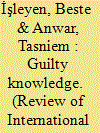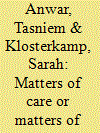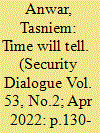|
|
|
Sort Order |
|
|
|
Items / Page
|
|
|
|
|
|
|
| Srl | Item |
| 1 |
ID:
193303


|
|
|
|
|
| Summary/Abstract |
This article studies practices of knowledge production during counterterrorism financing court cases in European courts. Developments in international law have contributed to novel regulations to criminalise and prosecute the funding of terrorism in advance of terrorist violence. In this study, we study how court cases have become important spaces for contesting and evaluating multiple knowledge claims on terrorist threat and suspicion by analysing case proceedings from both the Netherlands and the United Kingdom. Building on recent debates in International Relations and postcolonial theory, we make two contributions. First, building on insights from postcolonial literature on ‘abyssal thinking’, we illustrate how legal practices differentiate between different ways of knowing by dismissing certain experiences as ‘emotional’ or ‘subjective’ in contrast to the assumed objectivity of other knowledge claims. We argue that decisions on what counts as knowledge in a court setting are situated in a specific sociopolitical setting, whereby particular knowledge and life-worlds are recognised at the expense of others. Second, we empirically show how the novel criminal laws shifts the responsibility to know terrorist threat from the state to ordinary citizens. We illustrate how the court reinforces new security logics where the state can entertain doubt, uncertainty, and trust in their practices, while the citizens cannot.
|
|
|
|
|
|
|
|
|
|
|
|
|
|
|
|
| 2 |
ID:
193146


|
|
|
|
|
| Summary/Abstract |
International treaties and European directives have put new legal responsibilities on EU member states to pre-emptively monitor and prosecute terrorist activities and offences. In particular, the prosecution of terrorism financing has been an important focus to prevent material and ideological support for terrorist organisations. Yet, a clear distinction between humanitarian aid and terrorism financing in a complex war zone is not always easy to draw: Which of the involved parties is perceived as a terrorist threat, and what is exactly considered humanitarian aid work? In this paper, we empirically unpack how EU counter-terrorism laws and policies are actually practiced during court trials. We investigate the legal distinction between humanitarian aid and terrorism financing in Syria, specifically centring on trials from the Netherlands and Germany. Drawing on the growing debates in critical security and legal studies on materiality, we focus on how materials presented during trials such as baby products, weapons, and money, are inscribed with a particular security logic to reach a legal verdict. Introducing the concept of “matters of care/security”, we connect these debates and findings to insights from feminist and post-colonial studies to critically inquire how racialised and gendered assumptions on terrorist threat impact terrorism trials.
|
|
|
|
|
|
|
|
|
|
|
|
|
|
|
|
| 3 |
ID:
185182


|
|
|
|
|
| Summary/Abstract |
Calculating the potential risk of future terrorist violence is at the core of counter-terrorism practices. Particularly in court cases, this potential risk serves as legitimization for the preemptive criminalization of suspicious (financial) behaviour. This article argues that the preemptive temporality seen in such court cases is a practice of ‘sorting time’ and producing distinct legal definitions around future violence. Building on postcolonial and feminist scholarship on temporality, the article examines preemptive temporality as the material, embodied and multiple engagements with time that are enacted in terrorism court cases. Through the use of empirical data obtained from court observations, court judgements and interviews with legal practitioners, accounts of empirical temporalities are traced to illuminate other forms of violence that until now have been overshadowed by the dominant (and relatively unchallenged) perception of future terrorist threats that is enacted in the courtroom. In this way, the article makes two important contributions. First, it advances the theoretical debate on preemptive security through an examination of how legal and security practices co-produce temporality by defining future terrorist violence. Second, it contributes empirically by showing how temporality is constructed in multiple ways, paying specific attention to temporalities resisting dominating perceptions of future terrorist violence.
|
|
|
|
|
|
|
|
|
|
|
|
|
|
|
|
|
|
|
|
|